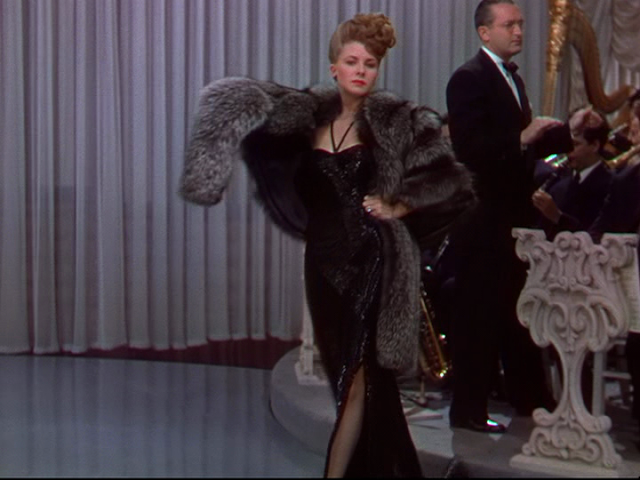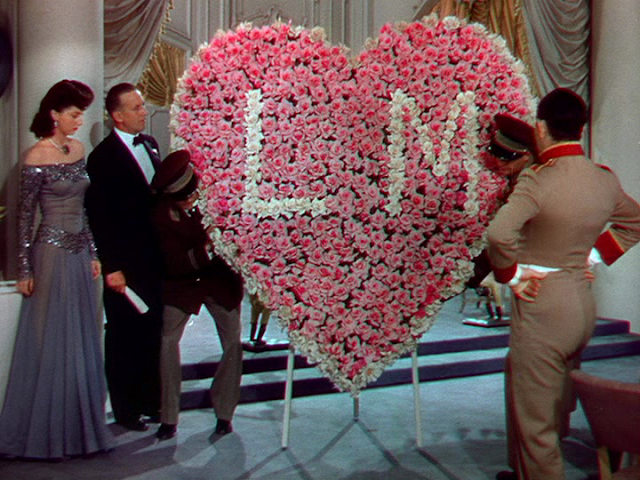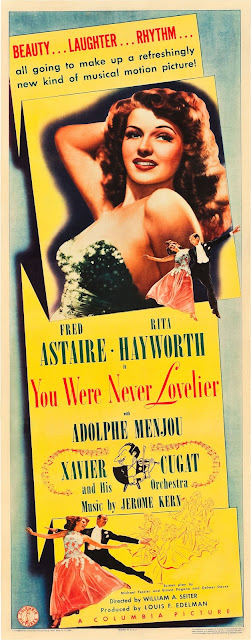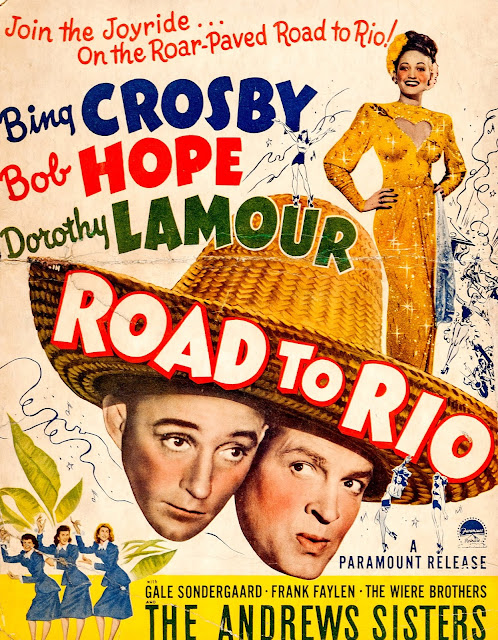Red Skelton and Gene Kelly pine for Lucille Ball in... Du Barry was a Lady (1943)
Have you ever loved a movie even though you know it isn't great? It isn't absolutely terrible, but it is also never going to be considered an underrated classic. It is just a film that you find enjoyable and comforting while everyone else, including the people who made it, thinks it deserves to be forgotten. For me, that film is Du Barry was a Lady, a musical comedy directed by Roy Del Ruth and starring -- wait for it -- Lucille Ball, Gene Kelly, Red Skelton, Virginia O'Brien, "Rags" Ragland, Zero Mostel, and Tommy Dorsey and his Orchestra.
May Daly (Ball) is a nightclub singer who is adored by many a man, including hatcheck boy Louie (Skelton) and a fellow club performer named Alec (Kelly). May reciprocates Alec's love, but she is determined to marry for money after seeing her parents struggle with finances all their lives. Alec promises May that once his songwriting career takes off, they'll be set, but May believes she will only be in his way. Louie, meanwhile, is chased by cigarette girl Ginny (O'Brien).
One day, Louie wins the Irish Grand Sweepstakes, prompting him to propose to May. She accepts, but makes it clear that she doesn't love him and she is only doing it because he can provide for her. Annoyed that Alec disagrees with May's choice to marry him, Louie is complaining to his friend Charlie (Ragland) when Charlie offers to slip Alec a mickey before the engagement party to keep Alec out of the way. Louie isn't so sure about it (maybe because it's an insane idea?), but he gives Charlie his permission -- and quickly regrets it when Charlie mixes the drinks up and Louie downs the pill.
One day, Louie wins the Irish Grand Sweepstakes, prompting him to propose to May. She accepts, but makes it clear that she doesn't love him and she is only doing it because he can provide for her. Annoyed that Alec disagrees with May's choice to marry him, Louie is complaining to his friend Charlie (Ragland) when Charlie offers to slip Alec a mickey before the engagement party to keep Alec out of the way. Louie isn't so sure about it (maybe because it's an insane idea?), but he gives Charlie his permission -- and quickly regrets it when Charlie mixes the drinks up and Louie downs the pill.
While unconscious, Louie dreams he is King Louis XV. He finds that people from his real life have become people from 1743: Charlie is his son, the Dauphin; an ex-suitor of May's is the scheming Duc de Rigor; May is Madame Du Barry, the King’s mistress; and Alec is the dangerous Black Arrow, an outlaw who blames Du Barry for the French people's high taxes since the King keeps buying her expensive presents. Once Du Barry sees the revolutionary in action, though, she falls for him and pleads with Louie to cancel his execution after he's captured by the Duc. Louie is then stopped by the Duc and engages in a swordfight that ends with Louie about to be beheaded. At this point, the actual Louie wakes up and encourages May to be with Alec. He is then informed by an IRS agent that the rest of his fortune must go toward taxes, leaving him broke once again. The cast joins May in cheering Louie up by singing a rendition of "Friendship," and all is well.
Du Barry was originally a 1939 stage musical by Cole Porter, starring Bert Lahr as Louie and Ethel Merman as May, with Betty Grable and future director Charles Walters in supporting roles. In 1941, RKO wanted the screen rights to make it a vehicle for Ginger Rogers, but MGM won out by also buying the rights to another Porter musical, Panama Hattie. MGM thought both properties were ideal for Ann Sothern, but when she turned down Du Barry due to pregnancy, the studio cast Sothern's friend, Lucille Ball.
Tired of being a performer, Charles Walters agreed to help Gene Kelly, an acquaintance from Broadway, when he asked him to work on Kelly's first solo for the movies, Du Barry being just his second film musical. The sequence starts with Kelly crooning "Do I Love You?" to Ball in her dressing room, causing her to confess that she does indeed love him right before Kelly is called onstage to dance to an instrumental of the song with chorus girls. According to his biographer, Phillip Brent, Walters told producer Arthur Freed that the moment would be more fluid if, instead of doing a hard cut from the dressing room to the stage, the camera followed Kelly as he excitedly made his way there, stopping to twirl around with Louise Beavers (who played Ball's maid) and jump over a table. Walters's idea made the moment more character-fueled and added a dynamism it previously lacked, which soon became a signature Walters touch.
Walters did such a fine job with "Do I Love You?" that Freed let him work on the title number, which Walters ends on a humorous note by putting Ball on the shoulders of a chorus boy so her enormous gown covers everything but his legs. The man then does the Charleston, making Ball look like a dancing giant:
Freed was again thrilled. The film's actual choreographer, Seymour Felix, was not. A hostile man who was disliked by the entire company, Freed fired Felix and kept Walters, who proceeded to create the routines for "Madame, I Love Your Crepes Suzette," "Friendship," and "Ladies of the Bath." Soon thereafter, Walters's agent and 20-year romantic partner John Darrow negotiated a standard seven-year contract at MGM. Four years after Du Barry, Walters would direct his first feature, Good News, and quickly become one of Hollywood's go-to musical directors.
Fun fact: Years later when Walters was directing High Society, he knew he needed a great duet for Frank Sinatra and Bing Crosby, a pairing that audiences were dying to see. Music supervisor Saul Chaplin went through countless songs before he came across the perfect choice, "Well, Did You Evah?" Chaplin looked more closely at the sheet music and found that the number was from Du Barry was a Lady, performed by Betty Grable and Walters himself.
Tired of being a performer, Charles Walters agreed to help Gene Kelly, an acquaintance from Broadway, when he asked him to work on Kelly's first solo for the movies, Du Barry being just his second film musical. The sequence starts with Kelly crooning "Do I Love You?" to Ball in her dressing room, causing her to confess that she does indeed love him right before Kelly is called onstage to dance to an instrumental of the song with chorus girls. According to his biographer, Phillip Brent, Walters told producer Arthur Freed that the moment would be more fluid if, instead of doing a hard cut from the dressing room to the stage, the camera followed Kelly as he excitedly made his way there, stopping to twirl around with Louise Beavers (who played Ball's maid) and jump over a table. Walters's idea made the moment more character-fueled and added a dynamism it previously lacked, which soon became a signature Walters touch.
Freed was again thrilled. The film's actual choreographer, Seymour Felix, was not. A hostile man who was disliked by the entire company, Freed fired Felix and kept Walters, who proceeded to create the routines for "Madame, I Love Your Crepes Suzette," "Friendship," and "Ladies of the Bath." Soon thereafter, Walters's agent and 20-year romantic partner John Darrow negotiated a standard seven-year contract at MGM. Four years after Du Barry, Walters would direct his first feature, Good News, and quickly become one of Hollywood's go-to musical directors.
Fun fact: Years later when Walters was directing High Society, he knew he needed a great duet for Frank Sinatra and Bing Crosby, a pairing that audiences were dying to see. Music supervisor Saul Chaplin went through countless songs before he came across the perfect choice, "Well, Did You Evah?" Chaplin looked more closely at the sheet music and found that the number was from Du Barry was a Lady, performed by Betty Grable and Walters himself.
As so often happened with the stars he worked with, Walters became lifelong friends with Lucille Ball during production. Whenever she swore that she couldn't do a dance step, he would say, "You can, now stop wasting time and get it done." The approach worked and a trust was developed. She would later say that it was because of her time at MGM and people like Walters specifically that she realized the breadth of her capabilities and her need to choreograph and rehearse her comedic routines.
Given Ball's status as a TV icon, I love seeing her pre-I Love Lucy film work. She was so clearly a star, and yet Hollywood didn't always know what to do with her. Although she didn't think much of Du Barry, the film was her first as an MGM leading lady. It was also where she first donned her signature look after hairstylist Sydney Guilaroff dyed her hair "Tango Red" and she was given a "scarlet, four-cornered mouth." Designer Irene then gave Ball an incredibly colorful wardrobe, which the actress described as "so vivid I felt like a sunburst, a prism, a tropical bird of paradise." A big point in Du Barry's favor is that it is photographed in stunning color by the great Karl Freund, gorgeously illustrating how Ball earned the nickname "Technicolor Tessie."
Later, when I Love Lucy was in its initial stages, Desi Arnaz hired Freund (pictured below with Ball) to be the show's director of photography. The work he did looks so wonderful. It was also pioneering. Freund designed the "flat lighting" system that sitcoms still use today. He also had the show recorded on film, which enabled Lucy to go into syndication later.
As a fan of Lucy, it's funny to see Ball cast as a nightclub singer in Du Barry when you know that one of the show's running gags is that Lucy definitely cannot carry a note. In real life, MGM didn't trust her voice either, dubbing her with Martha Mears except for "Friendship" where her comedic work partially depended on her voice. That song, by the way, is also connected to I Love Lucy! It is performed twice by Lucy and Ethel in the fantastic episode "Lucy and Ethel Buy the Same Dress." You can watch one of their renditions here.
Speaking of friendship, there was another upside to Du Barry for Ball and that was becoming friends with Red Skelton. In her autobiography, she described him as "a very sad clown... Something about him is just inescapably poignant." The two redheads had both appeared in supporting roles in 1938's Having Wonderful Time and Ball later did a spiritual follow-up to Skelton's The Fuller Brush Man with The Fuller Brush Girl, but Du Barry was the only film they truly co-starred in. They would also do guest spots on each other's TV shows, such as when they did a sweet "Freddie the Freeloader" sketch on The Lucy-Desi Comedy Hour.
I must admit I have a soft spot for Red, even if he did tend to overdo it in his comedy. When he quiets down, though, he consistently comes across as so sweet and endearing. There is a great scene where Louie as the king is chasing Madame Du Barry around her bedroom and after a few laps, he quips, "This ain't a love affair, it’s a track meet!" Finally, they become exhausted and to keep Louie's mind off of a certain quelquechose, she offers him food, leading into the cute "Madame, I Love Your Crepes Suzette." The number ends with them on Du Barry's bed, Louie noticing that each time he jumps it brings the Madame closer to him. However, before he can get his hands on her, the Black Arrow shoots an arrow through his wig and causes him to run away.
Another Skelton routine, "I Love an Esquire Girl," isn't essential to the plot, and Roy Del Ruth's direction is pretty shaky, but it is interesting for a couple of different reasons. With Tommy Dorsey and his Orchestra as Red's back-up, Dick Haymes and Jo Stafford get screentime as soloists. Marilyn Maxwell makes an appearance as the model for February, while Kay Williams, Clark Gable's widow, is the May model. A more notable cameo, though, is when Red sings a line about Lana Turner and the real Ms. Turner pops up oh so nonchalantly. (Gotta love MGM self-promotion.) The costumes are a mix of lovely and bizarre, too. This number is quite similar in style to the future "The Girl on the Magazine Cover" and "Beautiful Girls" sequences in Easter Parade and Singin' in the Rain respectively.
While Skelton and Ball didn't make a lot of movies together, he and Virginia O'Brien were like an unofficial team, having done Panama Hattie, Lady Be Good, Ship Ahoy, Merton of the Movies, and The Show-Off in addition to Du Barry. O'Brien and Skelton certainly have chemistry. Throughout Du Barry, she unashamedly chases him, flipping the traditional gender dynamic. One of my favorite exchanges is when Louie refuses Ginny's offer to drop him off at his home:
Ginny: "…give me my ring back!"
Louie, after admiring the ring on his finger: "Okay, you can take me home. But remember: we say goodnight at the door! Does that make you happy?"
Ginny: "Does that make me happy?" *she smiles for two seconds and then reverts to her trademark frown*
Louie: "Well, don't overdo it!"
Virginia O'Brien is a girl after my own heart. She is so offbeat and glamorous, I just love her. Her deadpan style and the unique, elongated inflections she does while singing mesmerize me. From the first time I saw her solo "Salome," with her bright green blouse and her striptease pantomime, I've never forgotten it. Years after Du Barry, when Charles Walters was teaching at USC and hosted a screening of the film with Ball in attendance, a student asked during the Q&A portion where O'Brien was keeping herself. "She's sitting back here in the cheap seats!" O'Brien yelled from the back of the auditorium.
Virginia O'Brien is a girl after my own heart. She is so offbeat and glamorous, I just love her. Her deadpan style and the unique, elongated inflections she does while singing mesmerize me. From the first time I saw her solo "Salome," with her bright green blouse and her striptease pantomime, I've never forgotten it. Years after Du Barry, when Charles Walters was teaching at USC and hosted a screening of the film with Ball in attendance, a student asked during the Q&A portion where O'Brien was keeping herself. "She's sitting back here in the cheap seats!" O'Brien yelled from the back of the auditorium.
Du Barry was Gene Kelly's third film, following For Me and My Gal and Pilot #5. He plays off very well against the other actors, and of course it is always fun to see him dance, even though he really just has the one routine. His alter ego of the Black Arrow feels like a foreshadowing of his future roles in The Three Musketeers and The Pirate, but Kelly didn't want to make Du Barry. He told his widow, Patricia Ward Kelly, that the only good thing about it was that he got to work with Lucille Ball "who was marvelous." He said the picture was "terrible," but "she was fun and a good actress."
One delightful outcome of Kelly's time on Du Barry is a series of photos he took with Zero Mostel and Judy Garland while she was making Presenting Lily Mars nearby. I love how Kelly is wearing his Black Arrow get-up and Judy is all dolled up for one of her scenes. You can just tell how much these two adored each other.
Du Barry has its flaws, without a doubt. Zero Mostel (in his film debut) is too over-the-top, for one thing. In his first scene, for example, he does a drawn-out Charles Boyer impression that goes from "wow!" to "please stop" after ten seconds -- and then it continues for two more minutes. The romance between Alec and May is too underdeveloped as well. Ball and Kelly have sparks, but most of their shared scenes are them fighting with each other, making their quick reconciliation at the end unconvincing.
There are also a few questions to be had about the plot. For instance, why hasn't Alec already been discovered when he works at the same club as Tommy Dorsey and Dorsey plays music that Alec has written? And why in the world does Charlie think slipping Alec a mickey is a good idea, and why does he already have one on him? It would have made more sense (and felt less icky) if Louie had just gone to sleep one night and dreamed the whole 1743 sequence rather than have two characters scheme to drug a third one.
There are also a few questions to be had about the plot. For instance, why hasn't Alec already been discovered when he works at the same club as Tommy Dorsey and Dorsey plays music that Alec has written? And why in the world does Charlie think slipping Alec a mickey is a good idea, and why does he already have one on him? It would have made more sense (and felt less icky) if Louie had just gone to sleep one night and dreamed the whole 1743 sequence rather than have two characters scheme to drug a third one.
A smaller but still irritating issue is the inclusion of the Three Oxford Boys, a snoozy trio who do musical imitations for a number at the beginning before mercifully disappearing. Unsurprisingly for classic Hollywood, much of the original musical's score and plot were dropped for the film. The Porter tunes "Friendship," "Katie Went to Haiti," and "Do I Love You?" were kept, but the rest of the songs are a grab-bag of different lyricists and composers, Roger Edens being the guy who wrote the most. While it is crazy to think of any Porter songs being let go, I do enjoy the tunes that replaced them.
Other mentionables include the magnificent costumes by Irene and Howard Shoup, the cavernous sets, and aesthetics that give meaning to the words "blazing Technicolor." Du Barry was a Lady is no masterpiece, but it is a cozy piece of cinema that I love rediscovering every few years.
______________________
This is my entry to the We Love Lucy Blogathon, a birthday celebration to the iconic Lucille Ball, hosted by Musings of an Introvert. You can check out the other entries here.



























































































































Definitely! Movies, like people, don't have to be "perfect" for us to love them.
ReplyDeleteYour glorious screencaps match the depth and wealth of information on "DuBarry" and I so enjoyed the article that I can't wait for TCM to schedule this movie again.
Thank you so much! This movie is so colorful, it's almost blinding, so I had a lot of fun doing those screencaps.
DeleteTotally agree. Your screencaps are like to watching the movie. Kay Williams would she be the May model?
ReplyDeleteThanks for a fantastic movie report. Stay safe and well
Ros Down Under
Yes, she is! I thought she was in the chorus, but I just checked IMDb and you're correct, so I've amended my post. IMDb also says that Ava Gardner plays a perfume girl in the "Ladies of the Bath" routine!
DeleteThanks, Ros! Take care!
Thanks for your marvelous blog post!
ReplyDeleteI've only watched Du Barry once and it's been many, many years, but I remember it was zany good fun. That's neat that Gene Kelly enjoyed acting with Lucy. He's one of my favorites too. I love all of your screencaps (those are awesome), and I'm so glad you participated in the blogathon! ❤
Aw, thank you! "Zany" is a great word for this film. Gene's widow, Patricia, had a nice story about Lucy and Gene in their later years. He asked her to be a part of some charity function he was hosting and she immediately accepted. When he tried to give her a check afterwards, she had no idea she would be paid and refused the money, which just made Gene love her even more.
DeleteI'm with you! I love this movie too! I agree -Virginia O'Brien was fabulous. She's one of my favorites too. And those pictures of Gene and Judy are so cute! I never saw those before!
ReplyDeleteVirginia O'Brien is just the best. Her persona is so quirky and so classic Hollywood -- I don't think we'd ever see someone like her today.
DeleteAren't those snapshots adorable? I'm obsessed with the one where they're dancing and Judy's dress is all flared out.
Thanks for reading!
Hello and thank you for this in depth review of Du Barry Was A Lady! My question concerns the trio the Oxford Boys - would like to know if the guitar player is music legend Chet Atkins? Thank you.
ReplyDeleteI don't believe so! I just did a quick search online and didn't find anything to indicate Chet Atkins was part of the group. They were also more of a comedy group than anything else as far as I can tell, so my gut tells me Atkins's involvement is unlikely.
Delete